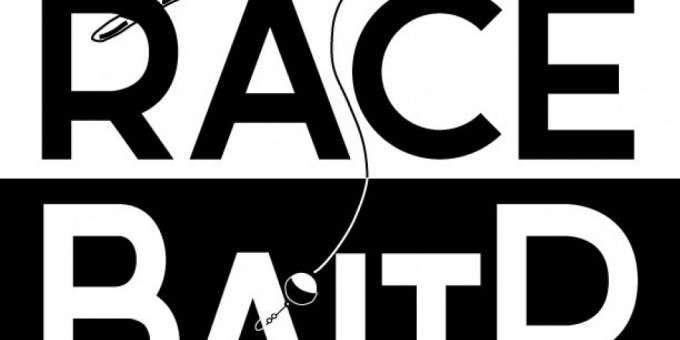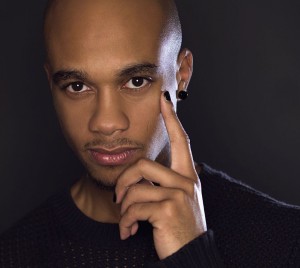
RaceBaitr talks #HistoryByHillary, queerness
Hari Ziyad, Black, 24-year-old genderqueer artist and writer, is the founder and editor of RaceBaitr. In March, when Hillary Clinton thanked Ronald and Nancy Reagan for starting “a national conversation” on HIV/AIDS, Ziyad started the near-instantly viral hashtag #HistoryByHillary. A generation ago, a cultural and political gatekeeper like Clinton would have had more time and gravitas on her side when so blatantly mistaking or misrepresenting the truth about marginalized communities (like those who died fighting AIDS in the 1990s and the queer people of color most affected by it now)—but not in the age of Black Twitter. Contexts board member Steven Thrasher interviewed Ziyad about Blackness, queerness, and using comedy and hashtags to consider the construction of both.
Steven Thrasher: You were born… in the early 1990s?
Hari Ziyad: 1992!
ST: So, I’m 38, and I was born in 1977. Before I understood consciously that I was a sexual being (let alone a homosexual being), I knew about Ryan White. He was a big presence in my childhood. And AIDS was everywhere in the ‘80s—Playing tag involved running around to touch each other and scream, “You’ve got AIDS!!!” I thought sex was going to kill me before I’d had my first erection.
You’re fourteen years younger. How did you first know about HIV/AIDS? Was there a “Ryan White” story for you? And how does HIV/AIDS fit into your life and community now?

HZ: Wow. I don’t even know when I was first introduced to the conversation around HIV/AIDS. I feel like by the time I was old enough, it had already been established as this dark cloud forever hovering in the background of any questions around my sexuality. A boogie man who increasingly threatened to appear the older I became and the more I explored. I never really heard about HIV/AIDS in the context of manageability, even though by then it was manageable. …It was still positioned as a death wish that came with choosing queerness, can you believe that?
So, I had a lot of conditioning to struggle through. Stigma is easily entrenched and is violent….
As I grew older—and in the context of HIV/AIDS in Black queer communities you grow older quickly—it directly impacted my friends and family more and more. I would not have thought a few years ago that people my age would still be dealing with this at this magnitude. Realizing this was also a realization that my work against oppressive systems must wrestle with this issue with the appropriate urgency. The fight never ended for Black queer folks. It barely abated!
ST: When Hillary Clinton thanked the Reagans for their leadership on AIDS, I had Madeline Kahn-like flames on the side of my face! I had trouble seeing straight, I was so angry. Did you have any visceral reactions?
HZ: I was shaking! I was shocked at how much it affected me.
ST: Did you think this was just a “gaffe?”
HZ: I can’t accept that …especially after her first apology was so offensively dismissive and even the second, longer apology did not tell the truth about the role the Reagans played.
The Secretary is supposedly well-connected to LGBTQIA orgs and has lauded her history with fighting for our issues. Though that history is not as pretty as she makes it sound, anyone who lived through that time would know better…. When her “apology” didn’t name the Reagans as integral players in the AIDS epidemic, it was clear she had no interest in the truth. It was pandering, pure and simple.
ST: I wrote my column about Clinton’s wretched AIDS revisionism for the Guardian, and I was heartened that so many people shared my anger, but I could only go so far in an 800-word British newspaper column. I feel like you went a lot further: You created the hashtag #HistoryByHillary, which was wickedly, deliciously hilarious. How and why did you do that?
HZ: An extreme distortion of history in return for votes is not new for Secretary Clinton, but she still gets a pass from so many folks on the left, especially Black and queer folks for whom her tendency to pull a veil over the past has been most detrimental. It was just such an absurd act, I started tweeting things equally as absurd along with the hashtag. Some folks on Twitter started retweeting. Eventually it hit [Black Lives Matter activist and former Baltimore mayoral candidate] Deray McKesson’s radar and it just took off from there.
The sad thing is folks started tweeting out both satirical examples of her revisionism and actual things she’s said and done, and it was almost impossible to tell the difference!
ST: What were the best responses you saw on Twitter?
HZ: Hamza Mussé calling the White protesters who greeted the Little Rock Nine when they integrated Central High “a parade of White supporters” was hilarious!
https://twitter.com/hamzamusse/status/708716184535957504
Black Millennials tweeting that COINTELPRO brought modern technology to the Black community knocked me out:
"Because COINTELPRO brought modern technology to the Black community. That's what unity & progress looks like." #HistoryByHillary
— Black Millennials (@BlkMillennials) March 12, 2016
And the Hillary flip-flops had me dying!
HILLARY FLIP-FLOPS!!! For the low price of $ Your Soul#HistoryByHillary
@Jmelhouck @ZeAlphaNerd pic.twitter.com/b2bPn6OtDw— Taco Trump (@TacoTrump2016) March 12, 2016
ST: How do you think Twitter and online humor can positively influence conversation? Clinton had to apologize more than she initially desired, and then Sanders announced a yuuuuuge HIV plan—the kind of expensively ambitious plan Clinton would probably have mocked as “never, ever” having a chance to pass a week earlier.
HZ: I love it! For one, some of the funniest people are on Twitter, particularly Black Twitter. Black folks are wonderful satirists. It’s a natural gift, probably because we’ve been the primary subjects of this political system’s ridiculousness for so long, and I think satire has always had one of the most importantly subversive roles in influencing political systems.
There are dangers to social media platforms—like how Facebook seems to censor activists and let abuses against them remain—but never have the people who have so much power over our lives been forced to be so accountable. The people who claim to work for communities, like Clinton for the LGBTQIA community, can’t just say it, the people being “helped” have to accept it. Not just the organizations, which can be bought, but the actual people. A few years ago, it’s highly likely that Clinton would have gotten away with her comments about the Reagans and HIV/AIDS.
ST: Tell me about RaceBaitR. What is it?
HZ: RaceBaitR is an online space I created with the intention of allowing folks to work through their relationship with oppressive systems without submitting to having that work make sense based on the rules of those systems. I don’t know if this is completely possible, at least not right now—I think we all feel the pull to abide by the laws of oppressive systems even when we don’t realize it. We know the danger in refusing to abide. But I think a space outside of oppressive gazes is something to constantly strive for. Originally, it was mostly my writing featured, but now I only publish other dope artists, typically once a week.
ST: Do you enjoy “racebaiting?”
HZ: I chose the name because I think when we have conversations about oppression honestly, when we aren’t capitulating to those systems and the people invested in them, we’re almost certainly going to be derided as “racebaiters,” “reverse racists,” “playing the race card,” etc. Embracing “racebaiting” was my way of embracing not needing to be understood by racists. Indeed, to necessarily be misunderstood. If a White supremacist isn’t made uncomfortable by your anti-racist work, you probably aren’t doing it right.
ST: Recently, the Centers for Disease Control projected that a staggering 50% of Black men who have sex with other men will become HIV positive in their lifetime. As someone who, like me and for purposes of epidemiology, is viewed by society as part of this demographic, how does it make you feel?
HZ: I wasn’t shocked. I have been seeing this happen all around me. I was aware that we were headed down that road, so it didn’t feel like news. I was shocked that people were shocked. It reminded me just how effectively these issues have been kept in the dark and just how much work we have left to do.
ST: In the Black gay activist community around AIDS, I became aware of some resentment around this statistic—that even just bandying this statistic about gives a fatalistic impression that it must be so and that we needn’t fight it. This has also made me think of Afrofuturism—that we needn’t accept a future predicated by false technologies of race or epidemiological racism.
HZ: I love that you bring up Afrofuturism here, because it’s such a queer concept to me, and my response to the resentment you describe is rooted in my understanding of queerness.
Predictions don’t erase alternative possibilities. I actually think it’s necessary that we spend significantly more energy wrestling with changing how we get to the future. I think a big part of that is taking predictions as they come and doing everything we can to challenge them. Oppression is so often about convincing marginalized people that things have to be a certain way. I’m interested in the process of unconvincing.
